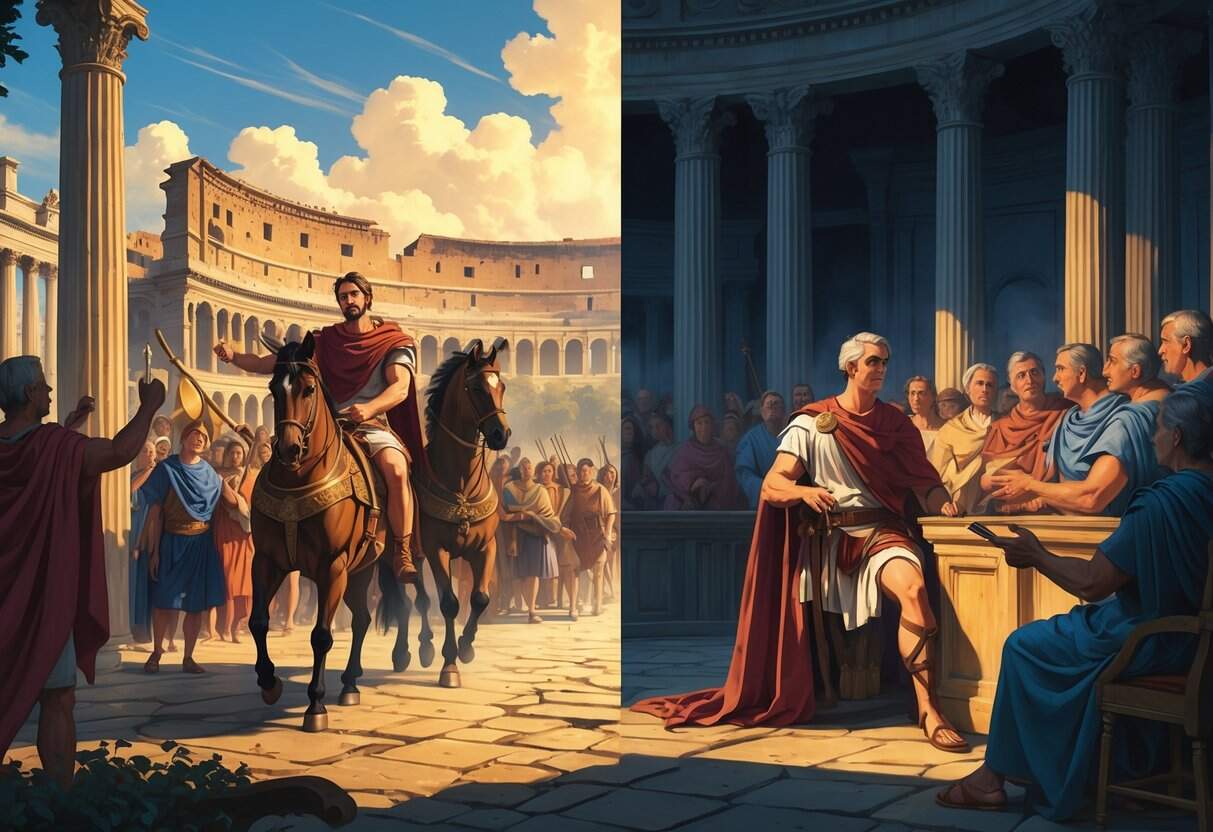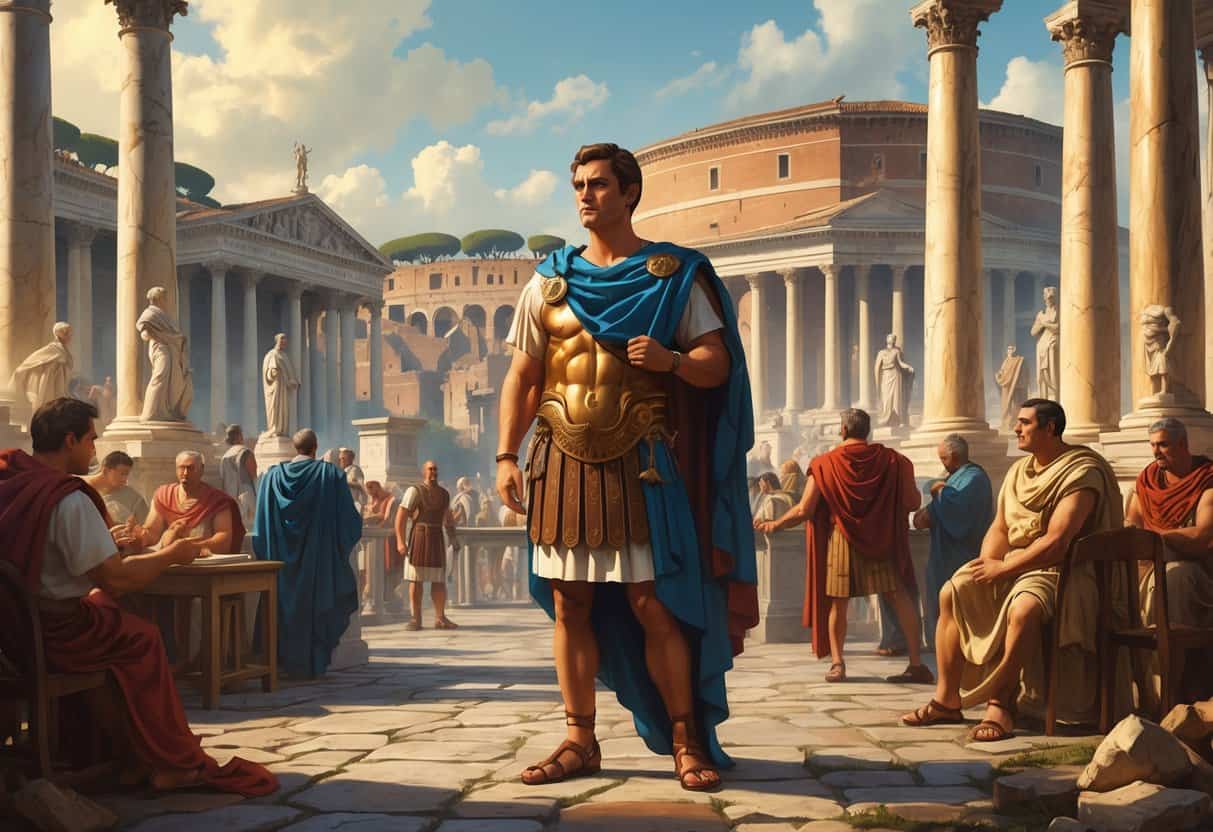Julius Caesar stands out as one of the most influential figures in Ancient Rome’s long, dramatic story. He climbed from being a military commander to a ruler whose choices would shift Rome from a republic to the empire you’ve probably heard about a million times.
His actions changed Rome forever. That’s not an exaggeration—this is where everything pivots.

Caesar’s alliances, like the First Triumvirate with Pompey and Crassus, gave him a serious leg up in the power game. His choice to cross the Rubicon wasn’t just dramatic—it was the spark that set off civil war.
His rule brought big changes but also a lot of anxiety among Rome’s elite, leading to the infamous assassination scene you probably know from Shakespeare.
You’ll see what made him rise so fast and why his fall was almost as quick. These events mark a huge turning point for Rome.
Key Takeways
- Julius Caesar’s leadership ended the Roman Republic.
- Key decisions led to both his rise and his fall.
- His life shaped the future of Ancient Rome.
Julius Caesar’s Early Life and Rise to Power

Julius Caesar’s early years set him up as a force in both war and politics. His family had connections, but he built his own reputation through gutsy moves and clever alliances.
He was born into a patrician family in 100 BC. They claimed Venus as an ancestor—imagine the family reunions.
Rome at the time was a mess, with endless arguments between political factions. Caesar wanted more than just the family name, though.
He studied law and oratory, both essential tools for anyone aiming high in Roman politics. After his uncle Marius lost power, Caesar had to lay low for a while, but he bounced back when things cooled off.
He focused on gaining key political offices and made sure to win over the common people. The tribunes—officials who protected the average citizen—were a big part of his strategy.
Military Campaigns in Gaul
Caesar’s real power came from his military triumphs in Gaul. From 58 BC to 50 BC, he led Roman legions north and took on the Gallic tribes.
These campaigns meant more land, riches, and a loyal army. His victories made him a legend back in Rome.
He didn’t just fight—he wrote detailed reports that won over the public. Controlling Gaul gave him the resources (and clout) to challenge his rivals.
Political Alliances and the First Triumvirate
To climb higher, Caesar teamed up with Pompey and Crassus around 60 BC. The First Triumvirate was an informal but powerful pact.
Pompey had military fame. Crassus brought money. Caesar had popularity and military strength.
Together, they basically ran Rome for a while. This alliance helped Caesar become consul and later governor of Gaul.
Of course, three ambitious men can’t stay friends forever. Tensions grew as each wanted more.
Impact on Roman Politics
Caesar’s rise shook up Roman politics. He leaned on his army’s loyalty and his alliances to challenge the old system.
He pushed through reforms—like changing the calendar and making laws to help veterans and the poor. Some of these stuck around for centuries.
A lot of senators started to worry about how much power he was gathering. His decision to cross the Rubicon with his army in 49 BC kicked off a civil war.
This move put the old Republic on the ropes and opened the door to dictatorship. Rome’s power balance shifted away from the Senate and toward leaders backed by the military.
Key Events in Julius Caesar’s Ascent and Rule
Let’s look at the bold steps Caesar took to grab power, his time as dictator, and the alliances that shaped Rome’s future. These moments pushed Rome from Republic to Empire.
Crossing the Rubicon and Civil War
In 49 BCE, Caesar crossed the Rubicon River with his army—breaking a big Roman law. That act started a civil war with Pompey, who had the Senate’s backing.
This was the point of no return. Caesar’s victory gave him control of Rome.
The war lasted from 49 to 45 BCE and ended when Pompey was defeated. That basically wiped out his main opposition.
Crossing the Rubicon became a phrase for making an irreversible decision. It left the Senate weak and Caesar stronger than ever.
Dictatorship and Reforms
After the war, Caesar was named dictator in 46 BCE. He used this power to push through a bunch of reforms.
He tackled debt and reorganized the calendar—hello, Julian calendar. He also packed the Senate with his supporters, shifting the balance of power.
Some of his laws helped veterans get land. Others limited the authority of tribunes.
His rule gave the state more muscle but made the Senate almost irrelevant. That tension would boil over soon enough.
Relations with Cleopatra and Mark Antony
Caesar’s relationships mattered as much as his battles. His connection with Cleopatra, Egypt’s queen, was both personal and political.
Cleopatra backed Caesar, helping him tap into Egypt’s wealth and resources. They even had a son, Caesarion, which tied their fates closer together.
Mark Antony, one of Caesar’s best generals, became a crucial ally. Antony helped Caesar keep his grip on power.
After Caesar’s death, Antony and Octavian (Caesar’s heir) battled for control. These relationships set the stage for the next round of power struggles.
| Event | Description | Impact |
|---|---|---|
| Crossing the Rubicon | Caesar invaded Italy with his army | Start of Roman civil war |
| Dictatorship | Caesar became dictator in 46 BCE | Reforms and decline of Senate |
| Relations with Cleopatra | Alliance and son Caesarion | Egypt-Rome ties |
| Alliance with Mark Antony | Military and political partnership | Post-assassination power struggles |
Assassination and the Fall of Julius Caesar
Caesar’s growing power freaked out a lot of senators. A group of them decided killing him was the only way to save the Republic.
The murder happened during a Senate meeting, and honestly, it turned Rome upside down.
Conspiracy and Key Figures: Brutus and Cassius
Brutus and Cassius led the plot. Both were senators who thought Caesar was about to kill off democracy for good.
Brutus, in particular, was seen as a symbol of honor. Cassius convinced him to join the conspiracy.
They rounded up about 60 senators—the so-called “Liberators.” Their mission: stop Caesar from becoming a dictator for life.
The Ides of March and Assassination
On March 15, 44 BCE—the Ides of March—Caesar was stabbed to death at the Theatre of Pompey. He took 23 wounds before it was over.
His supposed last words, “Et tu, Brute?” still echo today. The attack was quick and brutal.
The Senate hoped this would bring back the old Republic. Things didn’t go as planned.
Aftermath: Funeral, Riot, and Power Struggle
Caesar’s funeral, led by Mark Antony, turned into a riot. Antony’s speech fired up the crowd against the conspirators.
Chaos broke out. Rome was suddenly split between Antony (Caesar’s ally) and Octavian (his heir).
This power struggle didn’t bring back the Republic—it led to the Empire, with Octavian eventually becoming Augustus.
| Event | Key Details |
|---|---|
| Funeral | Mark Antony’s speech turned public mood |
| Riot | Angry crowds attacked conspirators |
| Power Struggle | Conflict between Antony and Octavian |
| Outcome | Start of Empire under Augustus |
Legacy and Cultural Impact of Julius Caesar
Julius Caesar didn’t just rewrite Rome’s political rules—he left a mark on history and culture that’s still felt today.
His story keeps popping up in literature, drama, and even modern politics. Writers like Shakespeare and Plutarch made sure we’d never forget him.
Transition from Republic to Empire
Caesar’s rise really did end the Republic’s system of shared power. Declaring himself dictator for life was a step too far for most senators.
After his death, Octavian (Augustus) used Caesar’s reputation to grab power. He became Rome’s first emperor.
That was it for the old Republic—Rome was now an empire, ruled by one.
Depictions in Literature: Shakespeare and Plutarch
You’ll find Caesar’s life and death in famous works. Plutarch, a Greek historian, wrote detailed biographies that shaped how later generations saw Caesar.
Shakespeare borrowed from Plutarch to write Julius Caesar. The play dives into themes like betrayal, ambition, and loyalty.
Shakespeare’s characters—Brutus, Antony—still show up in classrooms and theaters everywhere. The play keeps Caesar’s story alive, for better or worse.
Influence on Western Civilization
Julius Caesar’s impact goes way beyond ancient Rome. His reforms changed how Rome’s government and society worked.
The calendar most folks use today—the Julian calendar—actually came from Caesar. It’s wild to think something that old still shapes our daily lives.
You’ll notice Caesar’s influence in the way we talk about leaders and governments. His life’s basically the classic story of power clashing with democracy.
Western culture keeps coming back to Caesar when it talks about leadership, ambition, or political shake-ups. Even his name stuck around, morphing into titles like “Kaiser” and “Tsar” for rulers who came centuries later.